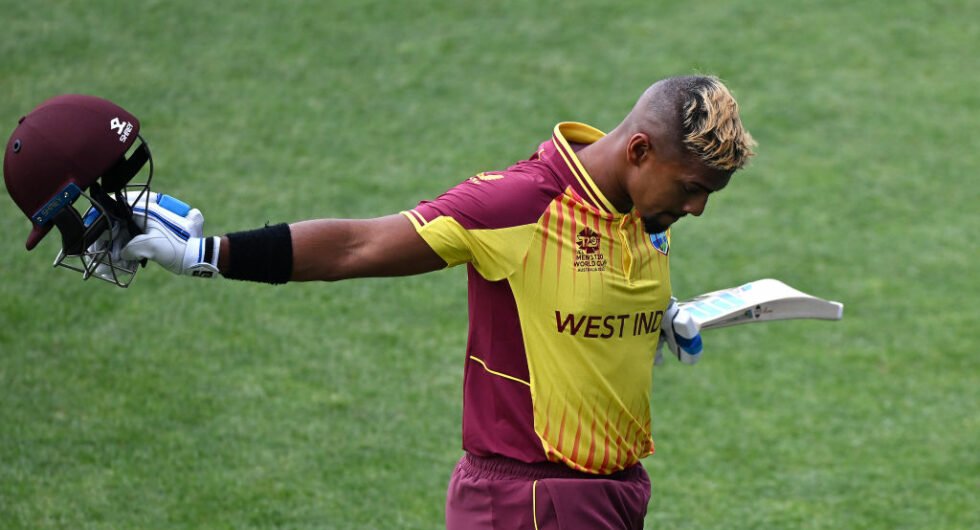West Indies cricket is on its knees – hope is the last thing to go, but it’s a finite resource

 by Phil Walker
by Phil Walker
@Phil_Wisden 4 minute read
Wisden Cricket Monthly editor-in-chief Phil Walker contextualises the despondent report into West Indies cricket following their abject showing at the 2022 T20 World Cup.
It’s a stretch to think Shimron Hetmyer would have made much difference, so absolute was the West Indies’ non-show at last year’s World Cup, so thickly coated in years of neglect, so lifeless and final. Still, it might not have been entirely remiss if he’d at least managed to turn up.
Here lies West Indies cricket today, a dead space where its best match-winner doesn’t play in a global event because, get this, the Berbice Bridge in Guyana was retracted and Shimron couldn’t get to the airport in time (for his second flight; it had already been rescheduled once). Where the once glinting poster boy for some vision of a coherent future is asked for his own version of events and eventually replies that he considers the matter closed. Where distrust between impoverished board and gilded freelancer is so deeply engrained that neither believes a word the other says.
The full account of Hetmyer’s absence is revealed for the first time on page 27 of the Executive Summary into the West Indies’ men’s performance at the 2022 T20 World Cup. Sounds dry? It’s anything but. Published last week, it’s a compelling read, full of highwire metaphors and cultural references from the pen of Patrick Thompson Jr, a senior high court judge, who compiled it with Brian Lara and Mickey Arthur.
The worse the break-up the better the art, and in step with the lyricism which has always poured out of West Indian cricket, so its collapse is poeticised in these pages. The tone is set in the first lines, with a paraphrased Malcolm Gladwell quote from Outliers – “Industrial disasters are often the result of a series of apparently unrelated events over time” – giving way to further cascades of grave warnings.
“There is no quick or easy fix to the challenges that we face,” we are told on page four, and lest there be any doubt, here’s a quote from Trinidadian calypso giant David Rudder: ‘Soon we must take a side or be lost in the rubble in a divided world that don’t need islands no more’.
Hetmyer’s is the perfect tale for the age, a tragi-farce so outlandish that it gets its very own section. But he’s far from alone. Sunil Narine and Andre Russell, his fellow titans of the IPL, also missed that World Cup, and while each case has its own messy shape, marked in large part by hopeless failures of management, the message amounts to the same: all this nationhood stuff? Rallying round the flag? Wouldn’t have thought so.
The talent pool is starkly shallow. Lose a few up top, and there’s not enough behind them. That World Cup saw them finish bottom of their group, behind Zimbabwe, Ireland and Scotland, while the tournament of 2021, with one win from five, was similarly abject. And this is the shortest format, where they are meant to still be relevant.
As the pool has drained out, the game has either held its nose (the Windies board; the ICC) or, in the case of the people, for whom all this is meant to be for, turned away and hoped for the best. A decade ago, administrators could cleave to a couple of wins in the T20 World Cup as evidence that it was just about holding together. The time for soft-touch diplomacy is now done. This is what’s at stake. The continued existence of the very thing that laid the ground for Hetmyer to become the player he is.
Point nine, page four: “It is not in the best interests of West Indies Cricket that our best players play in every global league and play for the WI Team on an optional basis… No Objection Certificates cannot be weaponized against the players, but it is essential that some middle ground is arrived at. Otherwise, West Indies Cricket may cease to exist as an entity.”
The report outlines quick- and medium-term fixes of varying degrees of plausibility. Most pressingly, the assembling of 30-35 players to play international men’s cricket over the next year, building to the 2024 T20 World Cup, part-staged in the Caribbean. A three-day summit featuring all parties – bosses, coaches, loyalists, dissenters – with nothing off the table. And perhaps most optimistically of all, a “concerted effort” to persuade their best white-ball players to play some red-ball cricket.
“We hold the strong view that red ball, and in particular Test cricket, against the Test teams ranked above us provides vital opportunities for primarily white ball players to develop their overall cricketing skills.”
It’s not without a certain naive hopefulness. Olive branches abound. The Hetmyer chapter even concludes by comparing him to Denis [sic] Rodman, drawing parallels between these flamboyant outlying talents of the kind that requires “wise and sensitive handling by coach and administration”. If that doesn’t do it, nothing will.
This is not about Hetmyer per se, but his talent and youth thrusts him into the vanguard. “I totally get that he has found this niche for himself,” Ian Bishop told Wisden recently, stepping along the narrowest of lines. “But I am hoping that there is an epiphany that says, ‘I’ve acquired a certain amount of wealth and time, and I will give back a little bit more to West Indies cricket’. I’m hoping that’s where it will go.”
Hope is the last thing to go, but it’s a finite resource. “To be honest, I hardly watch much cricket these days,” says Michael Holding. “As for West Indies cricket, I try not to think about it, because it is that painful. I’ve been very good friends with Andy Roberts since 1973 and he tears his hair out with what is happening – not because the team might not be doing well, but because he doesn’t see any future. I tell him, ‘Andy, I can’t afford to be getting worried about West Indies cricket, I have other things to think about and I can do nothing about it’.”
Holding doesn’t question Hetmyer or anybody else for grabbing what they can while the going’s good. “Let me emphasise, I do not blame any cricketer who wants to go and play in T20 leagues. They have got to think about their life when they have finished the game.” His ire is reserved for the suits. “The people who are in the administrative positions around the world need to recognise it’s the game that matters. Yes, you need money to run the game, but you cannot sacrifice the game just for money.”
This, then, is the true function of this report. Yes, to weave a few frayed strands back through a once great culture, to appeal to the consciences of elite players, and to serve as a documentation of past mistakes. But beyond that, beyond the squabbles and cat fights, past the egos and brinkmanship, this is a plea. West Indies cricket is on its knees here.
Shave off one corner, and the whole shape topples out of whack. Without deeper-reaching support, by way of a newly drawn social contract and a fairer distribution of central funds to incentivise loyalty, the poorer nations will crumble. We are seeing it happen in real time. And should and when they do fall, the tremors will be felt way beyond those little island talent factories. The game itself will cease to exist. Lose one, you lose them all.


